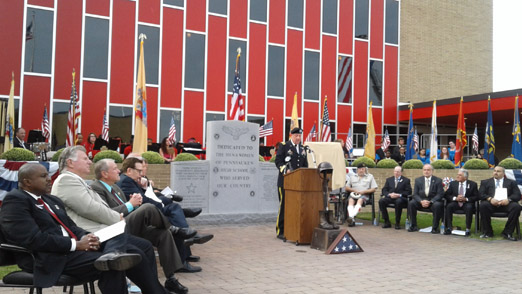By Frank Sinatra, AAP Editor
Each year, property taxes – based on the assessed value of a resident’s home – are used in a variety of ways in the community. Broken down into several sections, these taxes are used to pay for county services, school funding, trash and recycling collection, and municipal operations. These last two items are the responsibility of Pennsauken Township’s local government; and for the past several years, the town’s administration and the Township Committee have worked to maintain a fiscally responsible budget.
Pennsauken’s 2018 budget, which is awaiting approval by the State of New Jersey, is remaining flat with a zero increase. This means that when it comes to municipal services and trash and recycling collection – which equated to 25.6 percent of last year’s tax bill – residents will be paying the exact same amount as in 2017.
To break it down, each taxpayer in Pennsauken will pay .179 cents per $100 of their property’s assessed value for the garbage district budget (trash and recycling collections services) and .969 cents per $100 of their property’s assessed value for the municipal budget. The combination of the two rates, $ 1.148 per $100 of the assessed value, is the same as 2017. This is the sixth year in a row that Pennsauken residents have not seen an increase in this specific portion of their property taxes.
“We know that our residents have worked very hard to make a living for themselves and their families. And while there are parts of the property tax bill that are out of our control, we’re doing what we can to make sure we’re providing more on the municipal side without costing our neighbors anything extra,” says Pennsauken Mayor Jack Killion. “I’d like to commend my fellow Committee members and our administrative staff for making a zero increase possible for the sixth straight year.”
Pennsauken Township faces significant challenges every year to balance the municipal budget. But it’s more than just holding the line. In the past several months, the Township has hired eight new police officers, one Class II officer, two building inspectors, and two additional public works staff. The town’s administration has also made sure that each department has received the necessary funding they need for the year. There are also capital improvements planned for 2018. Two pumper trucks for the Pennsauken Fire Department have been budgeted and paid for; the Township is also projecting the purchase of a 12,000 sq. ft. existing structure adjacent to the Department of Public Works salt storage area. Pennsauken will also address improvements and repairs to its infrastructure, as there are 102 miles of road that the Township is responsible for maintaining, while replacing damaged curbing and improving storm drainage. Pennsauken’s 30 parks and playgrounds are also upgraded on a continual basis.
Several factors helped the Township maintain the level of local taxes. For the fifth straight year, Pennsauken had a tax collection rate in excess of 97 percent, coming in at the second highest all-time of 97.34 percent in 2017.
“We work very hard to do more with what we have,” explains Killion. “Our tax collection rate plays a big role in how we keep the municipal portion of property taxes down. Our tax office, run by Danny O’Brien, Pat Huerta, Kathie Kilroy, and Karen Dunn, who retired last year, do a great job. do a great job. We also can’t give enough credit to Ron Crane, our chief financial officer, and John Dymond, our assessor, who play very important roles in this process.”
The Township’s Economic Development Department has again secured additional businesses to move their headquarters into Pennsauken. New businesses coming into town help to increase tax ratables, which offset increasing municipal costs. Another important factor is the fees and permits collected through the town’s highly-successful Abandoned and Vacant Property Initiative.
“Terry Carr and Larry Cardwell, our Economic Development team, do an amazing job to foster business growth in our community,” says Killion. “And every home that stops being vacant and has a family move in is a real boost to our tax base.”
In addition, the Pennsauken Country Club generated $150,000 above the amount needed to cover operation costs and course maintenance. This entire amount goes directly towards property tax relief.
The services that Pennsauken Township provides its residents and businesses would not be possible without local property taxes. These taxes make up the largest revenue source in the municipal budget.
“Every year, our goal is to create a balanced municipal budget that maintains our services while being completely fair to our taxpayers,” explains Killion. “For six years straight, we’ve worked on not increasing municipal taxes and we’ve succeeded. We’re extremely proud of that accomplishment and will continue to do what we can to serve our constituents responsibly.”
Pennsauken School District Working On 2018-2019 Budget
As of press time for this edition, the Pennsauken School District was working on their budget for the 2018-2019 school year. According to school officials, the District has made it a priority to be mindful of expenditures and maintain fiscal responsibility during a period of positive change. For the 2018-2019 budget year, there will be no increase in the District’s line item budget. These expenditures will not cause an increase in the school portion of Pennsauken residents’ property tax bill.
In addition, the District’s existing bond will be paid off by March 2019; the bond referendum that was passed last month will pick up in September 2019. At that time, Pennsauken residents will begin to see their $11.08 savings.

